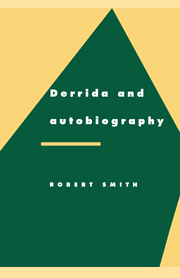2 - Pure reason, absolute knowledge, pure chance
Published online by Cambridge University Press: 03 December 2009
Summary
Hegel writes: ‘The sole aim of philosophical enquiry is to eliminate the contingent. Contingency is the same as external necessity, that is, a necessity which originates in causes which are themselves no more than external circumstances.’ His directive might support a prolonged meditation. The difference between it and what for shorthand I label a more deconstructive attitude to thinking highlights the latter possibly better than any other. Even though, as I have suggested, to depend on the unicity of ‘the work’ of a given philosopher may be regressive, the more so when the work (Hegel's) gets treated in its unitary distinction from another (Derrida's), and even worse when to enter into an affair of contrasts might be perceived as capitulating to the interests of the one, Hegel, the philosopher par excellence of differential contrasts; even despite these apparent relapses enough pedagogical benefit accrues to warrant them. That Derrida has examined quite conspicuously ideas of pedagogy and education in Hegel can only shed a dark light on my enterprise, and I refer the reader to his analyses. There subsists in my approach a preliminary selectiveness that is precisely the question, and coming clean about it will not escape the question either, as we shall see.
‘The sole aim of philosophical enquiry is to eliminate the contingent.’ With conjoint modesty and pride Hegel both draws the limits of philosophy, the very limitation of whose goals conforms to an ideal of scientific sacrifice, duty, citizenship or handmaidenliness, and at the same time licenses philosophy to police mercilessly the area whose resultant homogeneity will betoken the cohesion of its own corps or corpus.
- Type
- Chapter
- Information
- Derrida and Autobiography , pp. 13 - 28Publisher: Cambridge University PressPrint publication year: 1995



